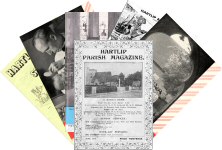
Hartlip Parish Magazine - on-line archive
May 1933 : page 2 (of 2)
VICAR'S LETTER.
My Dear People,-
Easter, preceded by Holy Week, has come and gone. With the glorious weather, accompanied by such a riot of fruit blossom in the orchards, it will long be remembered as an ideal time. Our services were well attended, and on Easter Day the number of communicants was ninety-seven. The Church was beautifully decorated for the festival, and thankis go out to all all who sent flowers and to the decorators for their loving skill.
I have to thank all who contributed to the Easter collections. £25/2/7 was placed in the bags, and this goes towards the Dilapidations Fund of the Cure. "Dilapidations" is the word used for the repairs and painting to the outside of the buildings and boundary walls. The repairs and renewals to the inside of the Vicarage are left to the discretion of the Vicar, but the Ecclesiastical Commissioners retain just over £38 per annum and deduct this from the stipend. Every five years the Diocesan Surveyor examines the property and gives his orders as to what must be done to keep it in first-class order, and the Commissioners are then responsiblefor the payment. On Easter Dav at 11 the Choir, for the first time sang the whole of the Communion Service, and we were out at the usual time. The singers did their work excellently. It was Queen Elizabeth who first ordered music to be written for the English Prayer Book service, and she commanded John Merberecke to write the music necessary. His service written in plain song is often used and is widely known. We sang a service by Dr. Woodward, the late Precentor of Worcester Cathedral.
Your sincerely,
CECIL G. MUTTER.
MEMORIAL CHALICE AND PATEN.
Mr. Geoffrey Webb has presented a silver chalice and paten to the Church. It is in memory of his late wife, Audrey, who died at sea off the West Coast of Africa. It is a beautiful gift and is of correct design. The chalice we already possessed was too big, akward for communicants, of poor design and difficult to cleanse, whereas the paten was really an old chalice cover, not made for the purpose, and too small to be convenient. What interest it possesses is of an antiquarian kind. Our thanks go out to Mr. Webb for his generous and seemly memorial.
ANNUAL MEETING.
This year the attendance was poor. We missed Colonel Locke from his accustomed place. The Vicar reviewed the happenings of the past year, and cordially thanked all the many willing helpers who have done so much for the welfare of the Church. The annual balance sheed, previously circulated was formally adopted.
The vicar nominated Colonel Locke as his Warden, and Mr. S. D. Hollands was unanimously elected as People's Warden.
Following this came the annual meeting of the Parochial Church Council. The ordinary business was transacted and thanks expressed for the willing co-operation of the members.
WOMEN'S FELLOWSHIP.
The members had a party in honour of their leader Mrs. Noble, on Thursday, April 20th. The hall looked very gay and Mesdame Friar and Ongley, as the oldest members were called upon to make a presentation to Mrs. Noble. This consisted of a Pyrex dish on a silver stand and three beautiful crystal vases. Mrs. Noble suitably responded.
Following this all sat down to at delicious tea, whilst music was supplied by a gramaphone. Afterwards recitations were given by various members.
CONFIRMATION.
Five candidates are to be presented at Rainham on Tuesday, May 9th, at 7.30 p.m. Friends are invited to be present at this service, to be conducted by the Bishop of Dover.
HISTORICAL NOTES.
The word "Hart" in Hartlip comes from the Saxon and means a herd. Probably in early times this district was more famous for cattle than cherries. What the earliest name of Hartlip was the writer has yet to discover, but adjacent as it was to the ancient Watling Street, from Dover through Canterbury and Rochester to London, no doubt there was a settlement here in the time of the Roman occupation. About the year 1750 there was discovered the remains of Roman villa in a field called Lower Dane-field, belonging to the Maresbrarrow (Meresborough) farm. The top of the ruins reached but even with the surface of the ground. Earth (says Hasted) was cleared away in hope, as usual of finding hidden treasure. The building was constructed of large flints, with two rows of large Roman tiles. Great quantities of these tiles were scattered round about, and from time to time other foundations of buildings were discovered. Several bushels of wheat were found parched and scorched by fire. The remains were filled up again with earth, and there is nothing now visible of the foundations still below.
The persistence of the name "Dane", such as Dane House, Dane Lane, Danaway, Danecroft, and the like, would point to the conclusion that the Danes came to Hartlip, and it is probably that they came and fought and plundered in those days following on the evacuation of the Roman soldiers from Britain about the year 410 A.D.
ASCENSION DAY.
May 25th is Ascension Day, one of the greatest Church festivals. Holy Communion will be celebrated at 6.30 a.m., and at 10, Children's Service at 9 a.m. The first Evensong will be on the 24th. at 8 p.m., following if fine, the usual Rogation Service.
The Sunday Scholars collected as Lunt denial the sum of £1/8/6 for the Waifs and Strays Society. The G.F.S. collected 2/9 for the Archbishop's New Churches Fund.
Members of the Mothers' Union, please note the Deanery Festival is to be at Upchurch on May 17th.
BAPTISM.
April 23rd - Adella Mary, daughter of Alfred William and Elizabeth Alice Pink.